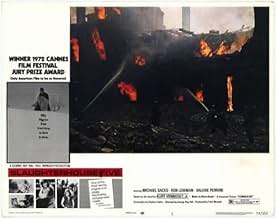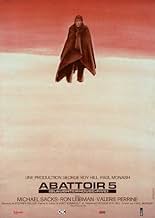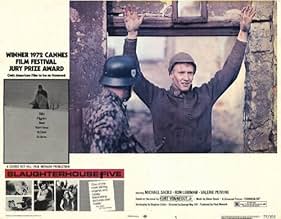CALIFICACIÓN DE IMDb
6.8/10
14 k
TU CALIFICACIÓN
Un hombre llamado Billy Pilgrim cuenta la historia de cómo se liberó a tiempo y fue secuestrado por extraterrestres.Un hombre llamado Billy Pilgrim cuenta la historia de cómo se liberó a tiempo y fue secuestrado por extraterrestres.Un hombre llamado Billy Pilgrim cuenta la historia de cómo se liberó a tiempo y fue secuestrado por extraterrestres.
- Dirección
- Guionistas
- Elenco
- Premios
- 3 premios ganados y 4 nominaciones en total
Friedrich von Ledebur
- German Leader
- (as Friedrich Ledebur)
Ekkehardt Belle
- Young German Guard
- (as Nick Belle)
- Dirección
- Guionistas
- Todo el elenco y el equipo
- Producción, taquilla y más en IMDbPro
Opiniones destacadas
10herbqedi
The realization of this glimpse into the mind's eye of a man unstuck in time is brilliant to behold. Yes, the book is a brilliant work in its own right, and open to interpretation, as a truly complex work must be. The movie is not the book. It is Hill's interpretation of the book, and a brilliant and viable one it is.
Hill won the best Director Oscar the next year with "The Sting". He later filmed the similarly unfilmable "World According To Garp" and also did a brilliant job with it, partially by letting go of John Irving's more depressing side. Other notable credits include Butch Cassidy... and The Great Waldo Pepper.
Michael Sacks, in his first movie, and only starring role at the tender age of 24, is completely convincing and natural. He is equally effective, compelling, and believable at the six distinct stages of Pilgrim's life memorialized herein. If he weren't up to the six-in-one role, the film wouldn't work, but he is, and it does. (I wonder why he has no other major credits, and ceased acting altogether in 1984. If anyone knows, please e-mail me.)
Valerie Perrine is fine as Montana Wildhack. The other characters are all played for maximum irony and effect, and the cast delivers beautifully, without exception. Eugene Roche is the epitome of kindness as Edgar Derby, the yin, to Ron Liebman's yang, a twisted ball of anger named Paul Lazaro. John Dehner is brilliant as a war-hawk professor upset at the Vietnam protesters. His character would be as appropriate amidst today's global conflagration as it was in 1966. Lucille Benson, Kevin Conway, Sorrell Booke, Holly Near, Richard Schaal, and Perry King are the more familiar names in a uniformly excellent cast, including the German actors.
The musical score is also perfect, both in tone and substance. Vonnegut is a master of superimposing satire over irony over futility. The movie does a marvelous job of blending these contrasts and making its audience feel enriched. The music underscores all of these contrasts. The cinematography also is magnificent.
Searching desperately for something to say to show that the movie cannot be 100% perfect, the only thing I can come up with is that the pacing of the movie drags slightly when the soldiers leave the first camp for Dresdner until their new Kommandant gives his "welcoming" speech. It might have played better with about three minutes cut from that sequence. So what?
I recently saw Slaughterhouse Five for the fifth time in 27 years since I originally saw it at my college campus -- this time on DVD. I never fail to catch something new, and I never fail to enjoy it all the more.
Given how many 70's movies have failed miserably to withstand the test of time, Slaughterhouse Five is a true treat to be savored.
Hill won the best Director Oscar the next year with "The Sting". He later filmed the similarly unfilmable "World According To Garp" and also did a brilliant job with it, partially by letting go of John Irving's more depressing side. Other notable credits include Butch Cassidy... and The Great Waldo Pepper.
Michael Sacks, in his first movie, and only starring role at the tender age of 24, is completely convincing and natural. He is equally effective, compelling, and believable at the six distinct stages of Pilgrim's life memorialized herein. If he weren't up to the six-in-one role, the film wouldn't work, but he is, and it does. (I wonder why he has no other major credits, and ceased acting altogether in 1984. If anyone knows, please e-mail me.)
Valerie Perrine is fine as Montana Wildhack. The other characters are all played for maximum irony and effect, and the cast delivers beautifully, without exception. Eugene Roche is the epitome of kindness as Edgar Derby, the yin, to Ron Liebman's yang, a twisted ball of anger named Paul Lazaro. John Dehner is brilliant as a war-hawk professor upset at the Vietnam protesters. His character would be as appropriate amidst today's global conflagration as it was in 1966. Lucille Benson, Kevin Conway, Sorrell Booke, Holly Near, Richard Schaal, and Perry King are the more familiar names in a uniformly excellent cast, including the German actors.
The musical score is also perfect, both in tone and substance. Vonnegut is a master of superimposing satire over irony over futility. The movie does a marvelous job of blending these contrasts and making its audience feel enriched. The music underscores all of these contrasts. The cinematography also is magnificent.
Searching desperately for something to say to show that the movie cannot be 100% perfect, the only thing I can come up with is that the pacing of the movie drags slightly when the soldiers leave the first camp for Dresdner until their new Kommandant gives his "welcoming" speech. It might have played better with about three minutes cut from that sequence. So what?
I recently saw Slaughterhouse Five for the fifth time in 27 years since I originally saw it at my college campus -- this time on DVD. I never fail to catch something new, and I never fail to enjoy it all the more.
Given how many 70's movies have failed miserably to withstand the test of time, Slaughterhouse Five is a true treat to be savored.
There seems always to be something exhilaratingly depressing about Vonnegut's work. It's as if our lives were slowly coming apart at the seams. There always seems to be an element of tragic waste in his characters' lives, and never is the feeling more evident than in the book and film of "Slaugherhouse-Five." It's not surprising to learn that Vonnegut really did live through the firebombing of Dresden during World War II.
If there's a weak element of the film, it's the bombing itself. By never letting the audience see outside the bomb shelter Pilgrim was in (and if so, not making it vivid enough for me to remember it), the horror and sheer magnitude of the event is downplayed. Two hundred thousand people died in the destruction of one of the greatest, most majestic cities in all of Europe, and all we're given is a shaking camera. Those who've read the book know that the trajedy was conveyed all to well by Vonnegut's skillful, near-photographic descriptions of the event and its aftermath. Very little of it made it to the screen.
Aside from that, George Roy Hill does an excellent job of communicating the existential dread of what must have been thought to be an unfilmable novel. The fate of Pilgrim's wife through her reckless driving could have come off as tasteless black comedy, but any cheap laughs are thankfully avoided, and the sequence is as shocking as it is heartbreaking. The really far-out parts of the novel (the four-dimensional aliens, Vonnegut's conception of the future and the end of the universe) are done with complete seriousness; another director might have had a condescending approach to the material, and killed the magic. The novel, by itself, is one of the best I've ever read -- it gleefully trashes the rules of standard novel-making, narration, and continuity, and manages to tell a real whale of a tale (there's a lot of weird stuff to swallow in it.) When I saw Hill credited as director, I moaned in agony, recalling the headaches that were induced by his smug, syrupy box office smashes "Butch Cassidy and the Sundance Kid" and "The Sting." After those two, I gave up all hope in Hill, the same way I did with Richard Lester after "Petulia" and "Help!" By the end of the movie, however, I ate my words. It's a beautiful, thought-provoking, and enchanting film, and does justice to a fine novel.
If there's a weak element of the film, it's the bombing itself. By never letting the audience see outside the bomb shelter Pilgrim was in (and if so, not making it vivid enough for me to remember it), the horror and sheer magnitude of the event is downplayed. Two hundred thousand people died in the destruction of one of the greatest, most majestic cities in all of Europe, and all we're given is a shaking camera. Those who've read the book know that the trajedy was conveyed all to well by Vonnegut's skillful, near-photographic descriptions of the event and its aftermath. Very little of it made it to the screen.
Aside from that, George Roy Hill does an excellent job of communicating the existential dread of what must have been thought to be an unfilmable novel. The fate of Pilgrim's wife through her reckless driving could have come off as tasteless black comedy, but any cheap laughs are thankfully avoided, and the sequence is as shocking as it is heartbreaking. The really far-out parts of the novel (the four-dimensional aliens, Vonnegut's conception of the future and the end of the universe) are done with complete seriousness; another director might have had a condescending approach to the material, and killed the magic. The novel, by itself, is one of the best I've ever read -- it gleefully trashes the rules of standard novel-making, narration, and continuity, and manages to tell a real whale of a tale (there's a lot of weird stuff to swallow in it.) When I saw Hill credited as director, I moaned in agony, recalling the headaches that were induced by his smug, syrupy box office smashes "Butch Cassidy and the Sundance Kid" and "The Sting." After those two, I gave up all hope in Hill, the same way I did with Richard Lester after "Petulia" and "Help!" By the end of the movie, however, I ate my words. It's a beautiful, thought-provoking, and enchanting film, and does justice to a fine novel.
10mmoore18
Like most of those who have posted before me, I am an avid Vonnegut fan and went into this movie with a guarded optimism that it would just be decent.
But George Roy Hill did an excellent job conveying the overall feel of the book -- the time jumping was flawless and I didn't find it hard to follow at all. The actor who played Billy Pilgrim captured Billy's passive, calm and vaguely anti-social demeanor. Lazarro, Montana and Billy's wife are also well played.
George Roy Hill had a knack for directing movies made from great books -- e.g., "The World According to Garp" -- and in the end, I was pleasantly surprised how well this movie turned out.
As far as the Vonnegut adaptations go (I know of four -- this one, "Mother Night," "Breakfast of Champions" and the god-awful "Slapstick") this one is the best of the bunch.
I've always wanted to see a movie version of "Sirens of Titan," but it'll probably never happen -- so "Slaughterhouse Five" is my only chance to "see" Trafalmadore.
Recommended to any true Vonnegut fans. Other people probably won't appreciate it.
But George Roy Hill did an excellent job conveying the overall feel of the book -- the time jumping was flawless and I didn't find it hard to follow at all. The actor who played Billy Pilgrim captured Billy's passive, calm and vaguely anti-social demeanor. Lazarro, Montana and Billy's wife are also well played.
George Roy Hill had a knack for directing movies made from great books -- e.g., "The World According to Garp" -- and in the end, I was pleasantly surprised how well this movie turned out.
As far as the Vonnegut adaptations go (I know of four -- this one, "Mother Night," "Breakfast of Champions" and the god-awful "Slapstick") this one is the best of the bunch.
I've always wanted to see a movie version of "Sirens of Titan," but it'll probably never happen -- so "Slaughterhouse Five" is my only chance to "see" Trafalmadore.
Recommended to any true Vonnegut fans. Other people probably won't appreciate it.
This is a very clever, thoughtful, well made movie. It succeeded in doing what I thought was nearly impossible, i.e. to put this amazing book on film. There are one or two small points that keep me from giving this picture anything higher than a 7, the main one being Ron Liebman playing the Paul Lazzaro role - highly irritating. Other than that, a brave and imaginative, clever, witty film that I would heartily recommend to anyone.
There is a definite 70s feel to this production of a book that does an amazing job of spanning the most fascinating period of American history -- 1945-1970. I first saw this film in 1986 as a late teen at the height of Regan America, the cold war, nuclear detente. Billy Pilgram was the beginning of that world that I was just starting to pay attention to. The movie had a really profound effect on me at the time. Reading the book afterwards and getting into his other books, didn't detract at all from my assessment of the movie adaptation. Even seeing it now many years later doesn't detract from an amazingly solid film. The transitions as Billy gets unstuck in time are some of my favorite movie images. Also beautiful is the music which totally turned me on to Glenn Gould.
¿Sabías que…?
- TriviaAlthough Vonnegut's renowned refrain, "And so it goes", appears over 100 times in the novel, it it is not uttered even once in the movie version.
- ErroresWhen Billy Pilgrim is asked by the American soldiers, "Where's your rifle?", he replies that he doesn't have one because he's a chaplain's assistant. However, in the United States Army, the primary duty of the chaplain's assistant in a combat zone is to protect the chaplain, so all chaplain's assistants must carry rifles. Because Chaplains are considered ministers in uniform they are forbidden from carrying weapons even when in combat zone.
- Citas
Billy Pilgrim: [in his sleep] You guys go on without me. I'll be alright.
Prof. Rumfoord: All he does in his sleep is quit, surrender, and apologize. I could carve a better man out of a banana.
- Créditos curiososThe Universal logo does not appear on this film.
- ConexionesEdited into The Clock (2010)
- Bandas sonorasConcerto No. 5 for Harpsichord in F minor, BWV 1056 - 2nd movement 'Largo'
Written by Johann Sebastian Bach (as J.S. Bach)
Performed by Glenn Gould, Piano
Columbia Symphony Orchestra
Vladimir Goldschmann, Conductor
Selecciones populares
Inicia sesión para calificar y agrega a la lista de videos para obtener recomendaciones personalizadas
- How long is Slaughterhouse-Five?Con tecnología de Alexa
Detalles
- Fecha de lanzamiento
- País de origen
- Sitios oficiales
- Idiomas
- También se conoce como
- Schlachthof 5
- Locaciones de filmación
- Praga, República Checa(as Dresden)
- Productora
- Ver más créditos de la compañía en IMDbPro
Taquilla
- Presupuesto
- USD 3,200,000 (estimado)
- Tiempo de ejecución1 hora 44 minutos
- Mezcla de sonido
- Relación de aspecto
- 1.85 : 1
Contribuir a esta página
Sugiere una edición o agrega el contenido que falta

Principales brechas de datos
By what name was Slaughterhouse-Five (1972) officially released in India in English?
Responda





































